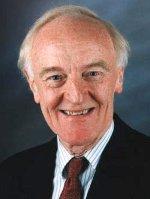Amyand David Buckingham CBE, FRS
About Optica
In Memoriam: Amyand David Buckingham CBE, FRS, 1930 - 2021
04 February 2021
 A. David Buckingham, OSA Fellow and 2001 recipient of the Charles Hard Townes Medal, passed away on 4 February 2021 at the age of 91. Buckingham was formerly a Professor of Chemistry at the University of Cambridge, United Kingdom. He was known for his research in the area of chemical physics and specifically, the measurement and understanding of the electric, magnetic and optical properties of molecules and the theory of intermolecular forces. He received the 2001 Charles Hard Townes Medal “for his many theoretical and experimental contributions to electro-optics and magneto-optics, including the invention and application of a direct method for measuring molecular electric quadruple moments.” Buckingham had the very special distinction of having a unit named after him, the Buckingham is the CGS unit of the electric quadrupole.
A. David Buckingham, OSA Fellow and 2001 recipient of the Charles Hard Townes Medal, passed away on 4 February 2021 at the age of 91. Buckingham was formerly a Professor of Chemistry at the University of Cambridge, United Kingdom. He was known for his research in the area of chemical physics and specifically, the measurement and understanding of the electric, magnetic and optical properties of molecules and the theory of intermolecular forces. He received the 2001 Charles Hard Townes Medal “for his many theoretical and experimental contributions to electro-optics and magneto-optics, including the invention and application of a direct method for measuring molecular electric quadruple moments.” Buckingham had the very special distinction of having a unit named after him, the Buckingham is the CGS unit of the electric quadrupole.
Buckingham was born in Pymble on Sydney’s North Shore in New South Wales, Australia in 1930. He studied chemistry at the University of Sydney under Professor Raymond Le Fevre, during which he completed a Bachelor of Science degree and a Master of Science degree. Following his studies at the University of Sydney, Buckingham pursued a PhD at the University of Cambridge, where he was supervised by the theoretical chemist John Pople.
After completing his PhD in two years, he was appointed a Student, [Fellow] of Christ Church Oxford in 1955 and a University lecturer in 1957. In 1965, Buckingham was appointed to the first Chair of Theoretical Chemistry in Bristol and in 1969, accepted a position as a Professor of Chemistry at the University of Cambridge. He would be in that post for 28 years during which time, for 21 years, he edited the International journal, Chemical Physics Letters.
Despite being a Theoretical Chemist, Buckingham was always been involved with experiments. He stimulated many experimental developments and his exciting predictions always demanded the ultimate sensitivity from the apparatus. The experimental studies of the Kerr effect carried out by David’s research students and associates over a period of 40 years in the Basic Physics division of the National Physical Laboratory, Teddington [1960 -1965], Bristol [1965-69] and Cambridge [1969-97] saw many developments and improvements in techniques. As in many other areas of his research, it was the masterly combination of experimental intuition and complete command of the theory which resulted in David Buckingham’s outstanding contribution to electro-optics.
Buckingham was held in very high regard by his former students and co-workers as this D.Phil. student said “His boundless enthusiasm has been a constant source of inspiration, and it has been a very great pleasure to work under and enjoy the friendship of such an exciting supervisor.”
Buckingham received numerous recognitions for his research including being elected a Fellow of the Royal Society (1975), OSA Fellow (2001) and American Physical Society Fellow (1986). He was a Foreign Associate of the US National Academy of Sciences (1992),a member of the Swedish National Academy, and a Corresponding Member of the Australian Academy of Science (2008). In 2006, he was the inaugural recipient of the Ahmed Zewail Prize in Molecular Sciences for pioneering contributions to the molecular sciences. Buckingham also received the Harrie Massey Medal and Prize (1995) presented jointly by the Institute of Physics and the Australian Institute of Physics.
Buckingham was a First Class Cricket player, representing Sydney University, Cambridge University, Free Foresters and I Zingari [founded in 1845]. He was involved in Cricket Administration for many years in Oxford and Cambridge before serving as President of Cambridge University Cricket Club from 1990-2009. David was a devoted family man, married to Jill for 55 years. They have 3 children and 8 grandchildren.
OSA and the scientific community mourn the loss of A. David Buckingham.
